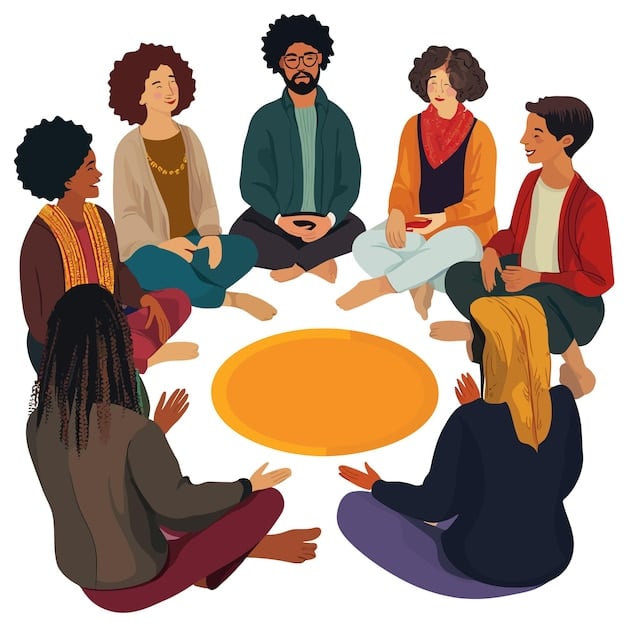The Power of Storytelling: Exploring Literature’s Impact with Author Insights

The Power of Storytelling highlights how literature, as explored through the insights of various authors, profoundly shapes society by fostering empathy, preserving culture, and inspiring social change.
The Power of Storytelling: [Author’s Name] on the Impact of Literature on Society remains a timeless subject, sparking discussions around its significance. Let’s delve into how authors perceive literature’s ability to shape our world.
The Enduring Legacy of Literary Influence
Literature’s influence on society is profound and multifaceted, shaping our perceptions, values, and understanding of the world around us. Understanding the enduring legacy begins with acknowledging its historical context and evolution through time.
From ancient myths to contemporary novels, literature has served as a mirror reflecting society’s triumphs, failures, and aspirations. It’s a dialogue across generations, enabling us to glean wisdom from the past, navigate the present, and envision the future. But how do contemporary authors view this impact?
Historical Context of Literary Influence
The roots of literary influence can be traced back to oral traditions, evolving over time with the development of writing and printing technologies. Each era has produced literary works that have shaped social norms, political ideologies, and cultural values.
Evolution of Storytelling Forms
Storytelling has evolved from epic poems and theatrical dramas to novels, short stories, and even digital narratives. This evolution reflects changing cultural preferences and technological advancements, each influencing how stories are told and received.

Over time, literature has adapted to technological innovations, with the internet and digital media fostering new forms of storytelling. The key to its sustained influence lies in its capacity to evolve alongside society’s changing needs and aspirations. This adaptability ensures that literature continues to be a potent tool for shaping our perceptions and values.
- Ancient Myths: Shaping early societies’ understanding of the world.
- Shakespearean Dramas: Exploring universal themes of love, loss, and ambition.
- 19th Century Novels: Critiquing social injustices and advocating for reform.
- Contemporary Literature: Addressing complex issues like identity, globalization, and technology’s impact.
In essence, literature’s influence is not static; it’s a dynamic force that adapts and responds to the evolving needs of society, ensuring its continued relevance as a catalyst for reflection, dialogue, and change.
Authors as Cultural Architects
Authors, as cultural architects, possess the unique ability to shape and reshape societal narratives through their words. Their stories become cultural touchstones, influencing how we perceive ourselves and the world around us. Let’s shed light on how authorship contributes to shaping culture and societal values.
An author’s vision extends beyond mere storytelling; it involves crafting narratives that reflect, challenge, and transform cultural values. Authors often explore themes of identity, morality, and social justice, prompting readers to critically examine their own beliefs and assumptions.
Reflecting Society
Literature often serves as a mirror, reflecting society’s values, beliefs, and prejudices. By depicting diverse characters and situations, authors encourage empathy and understanding among readers. This reflection is crucial for societal self-awareness and progress.
Challenging Norms
Many authors use their work to challenge prevailing norms and advocate for social change. Through compelling narratives, they expose injustices, question authority, and inspire readers to take action. These stories spark dialogue and contribute to the evolution of societal values.
Authors catalyze shifts in cultural values and perceptions. Through their powerful narratives, they initiate conversations that extend beyond the pages of a book, influencing societal attitudes and behaviors. These stories encourage reflection, debate, and ultimately, progress. Here are several influential narratives:
- “To Kill a Mockingbird”: Promoted racial equality and justice.
- “1984”: Warned against totalitarianism and surveillance.
- “The Handmaid’s Tale”: Highlighted the dangers of gender inequality and oppression.
- “Brave New World”: Offered a cautionary tale about technological advancements and dehumanization.
In essence, authors are not just storytellers; they are cultural architects who shape our understanding of the world, challenge societal norms, and inspire positive change through the power of their words.
The Power of Empathy Through Narrative
Narrative literature cultivates empathy by immersing readers in the experiences of diverse characters, fostering a deeper understanding of different perspectives and emotions. Empathy, the ability to understand and share the feelings of others, is a cornerstone of human connection and societal harmony.
Through the power of storytelling, readers gain insights into the lives of characters whose experiences may be vastly different from their own. This immersion fosters empathy, promoting understanding and compassion across social and cultural divides.
Diverse Characters and Perspectives
Literature introduces readers to a wide range of characters, each with their own unique backgrounds, beliefs, and challenges. By exploring these diverse perspectives, readers develop a more nuanced understanding of the human experience.
Emotional Connection to Characters
When readers become emotionally invested in characters, they are more likely to empathize with their struggles and triumphs. This emotional connection fosters a sense of shared humanity, breaking down barriers of prejudice and misunderstanding.

Promoting empathy enhances social cohesion. By fostering a deeper understanding of others’ experiences, narratives can bridge divides and promote inclusivity. This is crucial for building harmonious and resilient communities.
- Increased Understanding: Readers gain insights into different cultures and lifestyles.
- Reduced Prejudice: Empathy can break down stereotypes and biases.
- Improved Relationships: Understanding others’ emotions fosters better communication and connection.
- Social Cohesion: Empathy promotes inclusivity and reduces conflict.
Empathy, fostered through narrative, is a powerful force for breaking down barriers of prejudice and misunderstanding. By providing readers with a window into different lives, literature promotes compassion, understanding, and social cohesion.
Preserving Cultural Heritage Through Literature
Literature serves as a vital medium for preserving cultural heritage. Through storytelling, traditions, values, and historical accounts are passed down through the generations, ensuring the continuity of cultural identity. Exploring how literature actively contributes to the preservation of cultural heritage is essential in understanding its broader societal impact.
Literature acts as a repository of cultural memory, safeguarding traditions, languages, and customs that might otherwise be lost to time. By transmitting these elements through stories, literature ensures that cultural heritage remains vibrant and accessible to future generations.
Oral Traditions and Written Records
Many cultures have rich oral traditions that have been preserved through literature. Written records of these traditions help ensure their continuity, even in the face of cultural shifts and globalization. These stories provide insights into the values and ways of life of past generations.
Language and Identity
Literature plays a crucial role in preserving languages and cultural identity. By using traditional languages and dialects, authors keep these linguistic traditions alive. This is particularly important for marginalized communities whose languages are at risk of extinction.
Literature enriches our understanding of cultural diversity by showcasing the unique traditions, values, and experiences of different societies. This exposure fosters respect and appreciation for cultural differences, promoting inclusivity and understanding. Literature fosters cross-cultural dialogue:
- Preservation of Languages: Maintaining linguistic diversity through storytelling.
- Promotion of Cultural Pride: Encouraging communities to celebrate their heritage.
- Education and Awareness: Sharing cultural knowledge with wider audiences.
- Combating Stereotypes: Providing nuanced representations of different cultures.
Literature plays a vital role in safeguarding cultural heritage, ensuring that traditions, languages, and values endure through the ages. By preserving cultural memory, literature contributes to a richer, more diverse, and more inclusive world.
Inspiring Social Change Through Literary Activism
Literature has long served as a catalyst for social change, inspiring movements and reforms through its powerful narratives. Literary activism involves using literature to advocate for social justice, challenge oppressive systems, and promote positive transformation.
Through storytelling, authors can expose injustices, raise awareness about social issues, and inspire readers to take action. Literary activism harnesses the power of narrative to mobilize communities and advocate for a more equitable world.
Raising Awareness About Social Issues
By depicting the realities of marginalized communities and exposing systemic inequalities, literature can raise awareness about pressing social issues. These stories humanize complex problems, making them more relatable and prompting readers to empathize and advocate for change.
Mobilizing Communities
Literature can serve as a rallying cry for social movements, uniting people around common causes and inspiring collective action. By sharing stories of resistance and resilience, authors empower communities to challenge oppression and demand justice.
Literature has transformed societies by challenging norms, sparking dialogue, and inspiring activism. These narratives have shaped public opinion, influenced policy, and contributed to meaningful social progress.
- “Uncle Tom’s Cabin”: Fueled the abolitionist movement in the United States.
- “The Jungle”: Exposed the harsh conditions of the meatpacking industry, leading to food safety regulations.
- “Silent Spring”: Raised awareness about environmental issues, leading to the modern environmental movement.
- “The Diary of a Young Girl”: Helped humanize the victims of the Holocaust.
Literature serves as a potent catalyst for social transformation. By raising awareness, mobilizing communities, and challenging oppressive systems, literature inspires activism, promotes social justice, and transforms societies for the better.
The Future of Storytelling in a Digital Age
In an increasingly digital age, literature faces new challenges and opportunities. The advent of e-books, audiobooks, and online platforms has transformed how stories are created, distributed, and consumed. Let’s explore how the digital age is shaping the future of storytelling and literature.
Digital technologies have democratized access to literature, making books more affordable and accessible to readers worldwide. At the same time, the digital age has created new avenues for authors to connect with their audiences and experiment with storytelling formats.
E-books and Audiobooks
E-books and audiobooks have revolutionized the publishing industry, offering readers greater convenience and portability. These formats have also made literature more accessible to people with disabilities.
Online Platforms and Self-Publishing
Online platforms have empowered authors to self-publish their work and connect directly with readers. This has led to a surge in diverse voices and perspectives in the literary world.
New mediums are influencing the literary landscape. The integration of multimedia elements, interactive features, and transmedia storytelling has created engaging and immersive experiences for readers. These innovations are enhancing the storytelling experience and attracting new audiences.
- Interactive Fiction: Readers can influence the plot and character development.
- Virtual Reality Storytelling: Immerses readers in a virtual world.
- Multimedia E-books: Combines text, images, audio, and video content.
- Social Media Storytelling: Uses platforms like Twitter and Instagram to tell stories in real-time.
In the digital age, literature is evolving in exciting and innovative ways. As new technologies emerge, authors and publishers are experimenting with new formats, platforms, and storytelling techniques, ensuring that literature remains relevant and engaging for future generations.
| Key Point | Brief Description |
|---|---|
| 📖 Literary Influence | Shapes society by reflecting values and behaviors. |
| ✍️ Cultural Architects | Authors craft narratives that shape cultural values and identities. |
| 🤝 Empathy | Narratives help readers understand diverse perspectives and emotions. |
| 🌍 Cultural Preservation | Literature maintains cultural heritage through storytelling. |
Frequently Asked Questions
▼
Literature shapes societal values by presenting diverse perspectives and challenging norms, promoting empathy, understanding, and critical thinking among readers.
▼
Authors act as cultural architects, crafting narratives that reflect and challenge cultural norms, thereby influencing how individuals perceive themselves and the world.
▼
Reading stories cultivates empathy by immersing readers in the lives of diverse characters, helping them understand and share the feelings of others from different backgrounds.
▼
Literature preserves cultural heritage by passing down traditions, values, and historical accounts through storytelling, ensuring cultural identity continuity across generations.
▼
Literature inspires social change by raising awareness about social issues, mobilizing communities, and challenging oppressive systems, ultimately driving movements and reforms.
Conclusion
The power of storytelling: [Author’s Name] on the impact of literature on society is undeniable, shaping our perceptions, preserving cultural heritage, and inspiring social change. As we continue to navigate an ever-evolving world, literature remains a constant source of wisdom, empathy, and inspiration, reminding us of our shared humanity and the enduring power of stories.




![Author Spotlight: Unveiling [Author's Name]'s Writing-Life Balance Author Spotlight: Unveiling [Author's Name]'s Writing-Life Balance - Cover Image](https://noveltiesnew.com/wp-content/uploads/2025/06/noveltiesnew.com_3_1750100051_30a4b85f_cover-360x180.jpg)
![Author Spotlight: Highlighting Diversity and Representation with [Author's Name] Author Spotlight: Highlighting Diversity and Representation with [Author's Name] - Cover Image](https://noveltiesnew.com/wp-content/uploads/2025/06/noveltiesnew.com_3_1750100588_1bf502e6_cover-360x180.jpg)